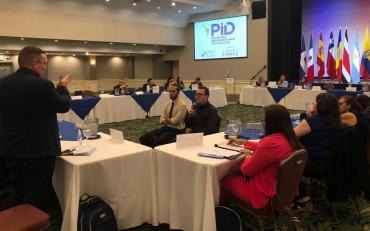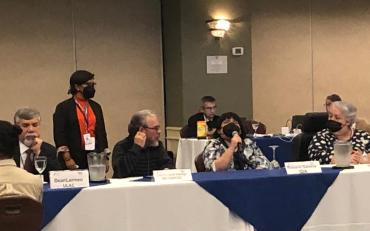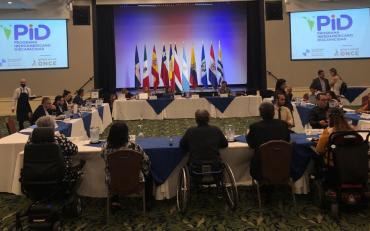For the first time since its creation, the Ibero-American Disabiilty Program (IDP) welcomed representatives of organizations of persons with disabilities (OPDs) in an official, inter-governmental meeting. The San José, Costa Rica gathering saw the participation of Juan Ángel de Gouveia, President of RIADIS, and of IDA's Rosario Galarza, discussing new ways to advance the rights of persons with disabilities in the region, with particular regards to access to justice. Their attendance may be the first step to a stricter collaboration between the IDP and the Latin-American disability movement in the months and years to come.
On May 19, the Latin American Network of Non-Governmental Organizations of Persons with Disabilities and their Families (RIADIS) and the International Disabilities Alliance (IDA) participated in a meeting organized by the IDP. This event was dedicated to the access to justice for persons with disabilities in Ibero-America, one of this year's priorities for the IDP.
The IDP is the first inter-governmental program of South-South and triangular cooperation aimed at mainstreaming the rights of persons with disabilities in public policies for an effective implementation of the United Nations Convention on the Rights of Persons with Disabilities (CRPD) and the achievement of the Sustainable Development Goals (SDGs).
The Ibero-American Disability Program is currently comprised of 11 countries as full members, namely, Andorra, Argentina, Chile, Costa Rica, Ecuador, Spain, Guatemala, Mexico, Dominican Republic, Uruguay and Paraguay. The ONCE Social Group hosts the technical management unit of the Program.
The IDP is structured around six strategic objectives to achieve its overall goal of contributing to the inclusion of persons with disabilities in political, economic and social life through policies that guarantee the full enjoyment and exercise of their rights under the UNCRPD and the achievement of the SDGs. Among its six strategic objectives, the IDP aims to ensure access to justice for persons with disabilities, as well as their equal recognition before the law.
The IDP working day was officially opened by Costa Rica’s Lizbeth Barrantes, current IDP Chair, and Juan Angel de Gouveia, RIADIS President. 
Rosario Galarza, Intersectionalities Officer at IDA, moderated the panel discussion on International Principles on Access to Justice for Persons with disabilities, along with the panellists María Soledad Cisternas, UN Envoy on Disability and Accessibility, Carlos Bernal, Rapporteur for the Inter-American Commission on Human Rights, Iris González de Valenzuela, Chairperson of the Organization of American States (OAS) Committee on the Elimination of All Forms of Discrimination against Persons with Disabilities, and José Ramón Antón Boix, Ibero-American Program on Access to Justice.
The Working Day also counted with key discussions on ‘Care for women with disabilities who are victims of gender violence’, ‘The exercise of legal capacity and political participation of persons with disabilities’ and ‘Initiatives to promote equality and non-discrimination of people with disabilities’.
OPDs representatives in the meeting acknowledged the importance of the subject and of the coordination between the involved governments and the civil society, as stated by RIADIS Chair Juan Ángel de Gouveia: “We believe that the opening of this space for dialogue is extremely important for RIADIS, also considering that the IDP is evaluating the official admission of our organization to the IDP advisory council. We understand that the IDP is committed to working hand in hand with both RIADIS and IDA carry out the high-level advocacy necessary to comply with the guidelines established in international legal instruments on the rights of people with disabilities. We consider that the participation of RIADIS and IDA in this space is part of a historic moment for the participation of people with disabilities in Ibero-America as a reference for the world movement of people with disabilities that must continue in the future.”

President de Gouveia’s words echo in the declaration of IDA’s Rosario Galarza: “The positive note of this event is that with governments becoming aware of what should be invested in capacity building, a strong regional movement of organizations of persons with disabilities (OPDs) can be generated to partner and collaborate with governments. It should not be barriers between governments and civil society. It was an excellent opportunity! Now, governments shall work on an action plan, with a clear roadmap with monitoring, evaluation, and accountability mechanisms”.
At the end of the event, five regional organizations of persons with disabilities, namely, RIADIS (Latin American Network of non-governmental Organizations of Persons with Disabilities and their families), ULAC (Latin American Blind Union), REDODICEC (Network of Organizations of persons with disabilities of Central America and the Caribbean), ALAMUD (Latin American Association of Women with Disabilities) and RELAVI (Latin American Network of Independent Living) made a joint declaration on implementing accessibility measures and modernizing the voting systems for the full enjoyment and exercise of the political rights of persons with disabilities.
